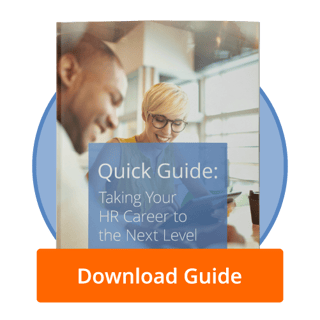Coming back to work after a vacation is difficult. Whether your vacation involved traveling the world or relaxing in your own backyard, getting back to the hustle and bustle of deliverables, emails and phone calls is a shock to the system. Did you know 55% of American workers surveyed left vacation days unused in 2015? While many factors are probably to blame, 37% of American workers claim returning to a mountain of work as the top reason for not taking time off. However, taking a vacation helps relieve stress, refreshes your mind and body and leads to better productivity. In a recent survey, 73% of people that don’t take time off reported they experience more stress at work.
Ready to take your HR Career to the next level? Download this resource to help guide you:

 37% of workers claim returning to a mountain of work as the top reason for not taking time off:
37% of workers claim returning to a mountain of work as the top reason for not taking time off:
It is important to understand the benefits of taking vacation time as well as how to best avoid an overwhelming post-vacation return. These 4 steps will help you reap the rewards of a vacation without stressing you or your colleagues.
Plan Ahead
Planning ahead will help you ease back into work and give you peace of mind while you are out of the office. Don’t procrastinate on upcoming projects and be as forthcoming about your absence as possible. That includes discussing your time off with your coworkers and any clients or external contacts who depend on you throughout the week. Set reminders for your teams, especially as you near your scheduled days off.
 Are you headed on vacation soon? Here’s how to ease back into work after:
Are you headed on vacation soon? Here’s how to ease back into work after:
Take your vacation organization to the next level by:
- Finishing major projects before you leave. If this isn’t possible, write your coworkers a detailed plan on how to carry the project forward while you’re gone or have an in-depth schedule for yourself when you return. That way you can jump back in immediately. Use bullet points to make your instructions clear and include any deadlines that cannot be missed.
- Make your vacation dates known to your team and clients. Use an automated email system to send out reminders while you are away to remind people of deadlines, important notes or time-sensitive issues.
- Set a point person and delegate. A well-staffed office should be capable of absorbing your workload. Roughly three weeks before your vacation give pertinent staff access to your calendar, set up a meeting to discuss key information around your projects and give them any other helpful tools so they are ready to take care of business while you are gone.
- Make a to-do list in advance for when you come back. Whether you have big projects in process or have finished everything before you clocked out, having a to-do list waiting for you will help lighten the overwhelming return. Establish your list by aligning your organizational goals to personal tasks. Create a folder within your email to archive anything related to active projects, so you can easily separate important emails from mundane “donuts in the breakroom” emails.
- Set your out of office and change your voicemail. Make your out-of-office and voicemail as detailed as possible, including the dates you will be gone, email address(s) of your point person/people, numbers to call in an emergency and if they will be able to contact you in the interim. Be sure to give them a sense of whether you’re totally off the grid or prepared to route and answer emails sporadically.
Be Honest With Your Connectivity
Some people are unable to fully disconnect while on vacation, however you should respect your relaxation time as well. If you will need to be somewhat connected to work, schedule a small window of time where you are available to answer calls or emails. Be sure to let coworkers know when this time will be, and that you are only available during that timeframe. Keep time zones in mind so your co-workers can accurately pinpoint when to reach you. If you know you’ll be in high demand, request they send bullet points and questions ahead of time so you can be prepared.
Tip: Ask clients and coworkers to title emails that require immediate response to have “URGENT” in the subject line. It will help you prioritize your check-in times and might encourage colleagues to really consider if their need is an emergency or if it can wait.
If possible, turn off your electronics at the start of the vacation. This can help prepare you to fully disconnect during your vacation and relax. Consider using only email push and pull notifications rather than real-time updates so you get a sense of what’s going on, but don’t have continuous pinging.
Traveling Home
Allow time for layovers on your travel back, especially if you have a layovers or potential for weather-related issues. Nothing makes coming back from vacation worse than a missed connection or having to sleep in an airport. Give yourself an extra day or half-day to allow for the unexpected. If everything goes as expected, you will be happy to have the time to unwind in your home.
Tip: When it comes to airport or airplane wifi, pick your poison. Either get up to date while on the flight (if you’re the type who cannot sleep on an airplane anyway) or decide to shut everything off and enjoy the last precious moments of time off. Don’t dabble between the two and stress yourself out further.
Be Self-Aware of Your Needs
Some people come back from vacation completely relaxed and ready to tackle new projects immediately, while others might need a few days to get back to peak productivity. While 82% of managers agree that vacation improves health, well-being, boosts morale and alleviates burnout, even the most dedicated worker might struggle with getting back to a routine. Take time to understand how you work best and allow yourself the grace period you need to fully excel in your work. A great way to approach this is by devoting your energy to ideation, cleaning up your space (digital and physical) and reviewing progress of projects. If you prepare, one or two days should be all it takes to swim through emails and follow up with your team and clients.
The quality and quantity of leisure time post vacation can help lessen the decline in health and well-being benefits from your vacation. If you can, arrange your day back to be a Tuesday, Wednesday or Thursday. Mondays may be too overwhelming, while Fridays may tax your team, especially if you need updates from them.
To most efficiently ease back into work:
- Don’t work overtime or stay late the week following your vacation. Establish limits to your tasks and expectations both for your team and yourself. This will help you better avoid burnout and undo all the relaxing your vacation provided.
- Take time to consider improvements and new ideas. Creativity can explode during post-vacation time, so don’t let it go to waste. Write down your ideas as they come and revisit them the following week when you’ve had a chance to consider all the work each will take you and your team. While your ideas seem brilliant to you, they may be overwhelming to those who didn’t just get back from Barbados.
- Don’t schedule any intense meetings on your first day back. You will not be as prepared as you should be and will instead create anxious tension for anyone involved. Instead give yourself a day or two to create briefs, go through your archived emails, get updates from your colleagues and figure out where the project and stakeholders currently sit.
- Contact your point people the first day for updates. This will help you get reacquainted with your projects and coworkers. Not only will it give you a chance to socialize and ease back into the swing of things, you will get a more accurate account of progress than email updates.
Tip: Balance tackling big project needs and deadlines with solving small, easy problems. Do this by establishing one big goal for your day and 3 or 4 quick goals. Write them down and cross them off as you complete. You will feel a sense of accomplishment without overwhelming yourself.
Taking time from work to recoup is critical to employee productivity, unfortunately the fear of returning to double the workload often leaves precious vacation hours unused. It doesn’t have to be a choice. With the right preparation and approach to easing back in, taking paid time off can bring you better productivity and creativity. If you need a little guidance on establishing goals for your return, download our guide to executing organizational goals through alignment. It will help you and your coworkers better prepare for future success.
Need a performance management tool that helps you and your team stay on track? Our software includes features for better goal setting and increased communication between employees and leaders. Want to see how it works? Take a personalized demo today!
Recent Posts:
.png)


